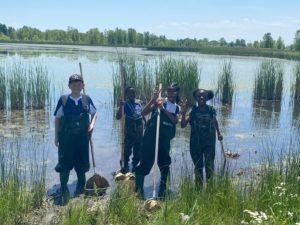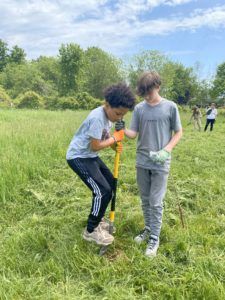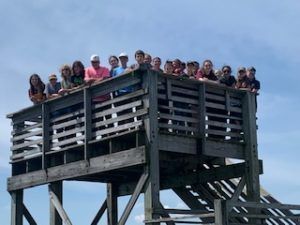On the Ground Jr. – Students Plant Native Trees Funded By Southeast Michigan Land Conservancy
OTG Jr. – Norup International Schools at Wetzel State Recreation Area

Students looking for macroinvertebrates in the water
On May 20 and 21, a total of 125 sixth grade students and faculty from Norup International Schools participated in MUCC’s On the Ground Junior (OTG Jr.) program in an effort to improve wildlife habitat and learn about Michigan’s natural resources at Wetzel State Recreation Area in Macomb County.
Wetzel State Recreation Area includes 900 acres of undeveloped land that offers numerous outdoor recreation activities including fishing, hunting, bird watching, and hiking. There are several ponds and a creek that runs through the public land.
During the two-day project, student volunteers split-up into small groups and rotated through four stations where they participated in activities ranging from planting native oak trees, archery lessons, wildlife population games, and a water program to identify aquatic macroinvertebrates.

Two students work together to dig a hole for tree planting
Trees for this project were funded by the Southeast Michigan Land Conservancy (SMLC) through the Forest to Michigan Faucet Program. There are five main objectives of the program:
- Educate people in Michigan about connections between forests and drinking water.
- Help municipal water utilities implement source water protection plans to lower treatment costs.
- Protect forests from land use change with conservation easements to retain important forests in a watershed.
- Manage forests well with landowner education, forest certification, Master Loggers, prescribed fire and other methods.
- Expand forests by planting trees in strategic places, especially riparian zones in urban and agricultural areas.
This station provided a unique experience for students to work together to plant native trees and learn how Michigan’s forests protect our drinking water. Students planted 35 bur oak trees and added protective tubing around them to increase their chance of survival. This opportunity would not have been possible without the support from SMLC. Learn more about Southeast Michigan Land Conservancy at smlcland.org
OTG Jr. – Reese High Outdoors Club at Fish Point State Wildlife Area

Students look out at Fish Point State Wildlife Area from the observation tower
Later that week on Thursday, May 23, 20 students from Reese High Outdoors Club participated in an OTG Jr. project at Fish Point Wildlife Area. Students learned about waterfowl management and hunting from a Michigan DNR wildlife biologist prior to the habitat project. Then, students got to work by removing invasive black locust and autumn olive along a drainage ditch. By removing these species, students created higher quality habitat for wildlife and improved boating access for anglers.
If you are interested in getting involved in MUCC’s On the Ground or OTG Jr. program, please visit mucc.org/on-the-ground/ or contact Habitat Program and Partnerships Coordinator Sarah Scheitz at sscheitz@mucc.org.
Recent Posts



